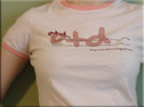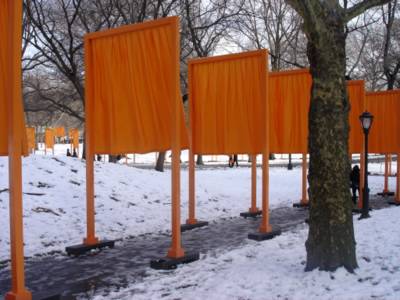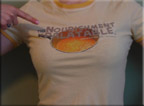Monday, February 28, 2005
Sunday, February 27, 2005
Tuesday, February 22, 2005
The Gates
I didn’t know if I’d like the Gates, but I didn’t doubt its legitimacy as art. Christo had a vision and he shaped it into something sensual. So I went to partake in this great debate everyone around me was discussing. The Gates are an acquired taste, I decided. My initial reaction was that the color was so hideous I couldn’t look past it. By the time I was halfway through my walk, I couldn’t stop smiling. The Gates made me happy. And it wasn’t because I actually got a piece from one of those ladies with the tall poles topped with tennis balls.
The Gates are a bright, ugly shade of orange. They are boxy and not too aesthetically pleasing. But they sway with the wind, they don’t fit in, and they are the brightest looking things in Central Park in the middle of February. I totally love the Gates.
Friday, February 18, 2005
Friday, February 11, 2005
If diplomacy requires me to shake hands with those who allow me to be hated, I will be a diplomat no more
den Menschen frei,”--work will set you free.
It soon dawned on me that the sign meant that
laboring in this murderous camp frees you and strips
you of your humanity.”
-My great-grandfather, Opa, upon his arrival to Bergen-Belsen
from his privately published memoir To My Dear Children
There is a sign in the Palestinian Club room at Hunter that says, “History Repeats: Look What Hitler Taught Some of His Victims.” The letters on the sign are dripping, as though of blood. Under the copy is a star of David morphing into a Swastika. That’s right, not an Israeli flag morphing into a Swastika or Ariel Sharon learning from Hitler--a Magen David--the emblem of Hitler's victims, the Jews, on the sign.
I know this because I saw it. I walked into their club space one day after hearing about the sign and saw it up close. My heart sped up, my breathing stopped, and my eyes were trying not to look at the one thing they couldn’t stop looking at.
My grandmother spent her young teens barely living in Bergen-Belsen, a Nazi concentration camp in northwestern Germany, during the Holocaust. According to the Simon Wiesenthal Center, “50,000 Jews and other prisoners died of disease, brutality, starvation, and sadistic medical practices” at Bergen-Belsen. My grandmother and her family were some of the few fortunate survivors. My grandfather’s entire family was killed when their shtetl in Lithuania was massacred during the Holocaust.
I tried to consider the possibility that the people who made the sign and the club who hung it on their clubroom wall hadn't realized what it might be like for a grandchild of Hitler's victims to see a sign that calls her Hitler. Maybe the Palestinian Club didn't mean to call me a Nazi, but intended, rather, to make a political statement. Of course, while I had to consider that, I feel that regardless of their intent, they took it too far.
After months of going back and forth between the Leadership Council for Jewish Student Life, the Palestinian Club leadership, and Dean Escott, we finally had a meeting at which two delegates (me and Steve) were going to tell the Palestinian Club how we felt about their sign and have them vote on the necessity of having it hanging in their room.
I was waiting in Room TH 105 with Steve Yuniver, the president of HIPAC, for the Palestinian Club to come and begin the meeting at which they were supposed to vote on the fate of the sign hanging in their club room. Palestinian Club members trailed in a few at a time until we were really just waiting for the leadership to arrive.
I saw Dean Escott walk in with the Palestinian Club leaders and sit down at the head of the three small, round tables we had pushed together. He put a copy of an article I wrote for CampusJ on the table and addressed me concerning it. Apparently, there is a difference between a legal right and a moral right. I wish I would have known about this when the first issue--that of the sign in the Palestinian Club room--came up. Now that I’ve been thinking about it a lot, I think I can remember him telling me and another Jewish student that while it may not be morally right for the sign to be up there, it is legally right. This time, however, I got the flipside of the argument.
I explained to him that as this is an issue that pertains to all students on campus, all students had a right to know what was going on. When I was at that meeting last semester, I was there as a representative for the Jewish community, not for myself alone. It was well understood at the beginning of the meeting that we Jewish leaders would leave and report back to our community and that the Palestinian Club leadership would report back to their club.
Then Dean Escott told me that it was wrong of me to make this known to people in other schools, too. What I didn’t say but should have was that if there is something that he doesn’t want other people knowing about it should be a situation. It’s okay that I left that out, though, because there is so much more I did say on the topic.
I told him that when we originally approached him, he explained to me that he was aware of the situation, but that the Palestinian Club had a right to free speech. He then warned us that if anyone were to rip the sign down he would be the one in a position to expel the student and he wouldn’t hesitate to do so. Our meeting lasted no more than 5 or 10 minutes.
I didn’t end there, though. I went on to explain that near the end of the meeting that Jerrell Robinson moderated between us and the Palestinian Club, he and Dean Escott were trying to convince me and the HIPAC officers present that maybe it was time we “looked beyond the sign” and worked with the Palestinian Club anyway. They implied that we were being silly in getting worked up over the situation and should act mature and swallow our misgivings. I felt that I was being told that I didn’t have a right to be offended by the sign and that my feelings about it were not being allowed validity.
“And that, Dean Escott, is discrimination.”
He argued that he worked hard to make that meeting between us and the Palestinian Club possible, but I could argue strongly against that. When we first went to him he really had no interest in getting involved. I think he saw it as a student affair to be settled between the students. It was when I saw Dean Schachter, the Dean for Diversity (God bless her!), that I was told that the President’s office had only recently been made aware of the issue and that a meeting would happen very soon--she’d have Dean Escott on it.
Between when I saw the sign hanging on the wall of the room until today, three months later, my intolerance for it has grown. Originally, some friends criticized me for not being enraged enough (others, of course, thought I was nuts to get excited). But I figured then that it was just a sign. Words don’t mean the world and I haven’t seen the students who hung it up attack any Jewish students yet. But then I tried doing something about the situation and felt that I kept running up against a brick wall. The Palestinian Club wasn’t as cooperative as I would have liked and the Dean of Students did not have any interest in helping us arrive at a conclusion until an authority above him made him get involved.
I started wondering if the sign had been a direct attack on any other minority, whether it would have been considered as acceptable as this one. It doesn’t seem very likely that if the Conservative Club had a Confederate Flag with racist slurs painted onto it, or a sign proclaiming that all practitioners of Islam are suicide-bombing Fundamentalists, that it would still be around.
I am a strong believer that it is not history that repeats itself but human nature that doesn’t change. When we stop allowing a group of people to feel a certain way, and strip their feelings of validity, we are not too far from not considering them as human as we are.
While at a recent conference, I heard Rachel Fish of the David Project speak about a similar situation she faced at Harvard Divinity School when she was a graduate student there. She said she found herself having to say, “words have consequences, so it does effect me,” to people who thought she was overreacting. I think she’s right. The sign my Opa was greeted with at Bergen-Belsen was just a sign. The sign in the Palestinian Club room is just a sign. But pictures speak a thousand words and a person’s reaction to a picture speaks even louder about their society.
Tuesday, February 08, 2005
Chutzpah: Saudi Style
I have to admitt that i found this article by going through Jewschool.com.
Saudi official: Bin Laden sent by Jews
Defense minister spoke ahead of global confab in Riyadh
Speaking at a meeting of Saudi leaders in preparation for the kingdom's international conference on counterterrorism, Defense Minister Prince Sultan referred to Osama bin Laden as being "sent by the Jews."
The prince was quoting a poet who said, "Long live security - may its men hold their heads high on every corner. [Bin Laden], whose ideology is sick, who was sent by the Jews, who is the architect of theft, was treacherous and sent us the criminals. This traitor of the nation tried to harm us, but his efforts boomeranged back upon him."
Friday, February 04, 2005
Parshat Mishpatim: Part Deux
Once, a friend asked if I could buy him a siddur. I went to the local Judaica store and picked up a small, travelable Artscroll for him. I figured it was the best one because there are enough commentaries on the bottom to keep him interested and enough obscure brachot and different prayers in there to keep him looking through it. He was really happy with the gift I had given him and used to bring it to school everyday. (It’s possible he still does, but I can’t state that with certainty.)
One day in Hillel, this friend was packing up his things to go to class when someone noticed the Artscroll in his bag. A secular guy with an Artscroll??? Clearly, the guy was confused by what he had just seen. Actually, he made it clear that he was confused.
While walking to the elevators with said secular friend, he commented to me that sometimes he feels isolated in the Hillel room. One of the tribe and he felt like he didn’t belong among us. I don’t know if heartbreak would be the appropriate term for how I felt when I heard that, but if it isn’t, I felt something close to that.
In this week’s parsha, it says,
“You shall not abuse a stranger and you shall not oppress him, for you were strangers in the land of Egypt. You shall not persecute any widow or orphan. If you will persecute him…! -- for if he will cry out to Me, I shall surely hear his cry. My anger will burn and I shall kill you by the sword, and your wives will be widows and your children orphans.”Intense.
And something to keep in mind always, not just when it's what we read from the Torah that week.
Parshat Mishpatim: Part One
I once read somewhere, and I can’t remember, where someone used the verses,
“When two men will fight and they will jostle a pregnant woman and she will miscarry, but there will be no fatality, he shall surely be penalized when the husband of the woman shall impose upon him, and he shall give it thought the judges’ orders. But if there will be a fatality, then you shall give a life in place of a life…”
to explain the Jewish view of abortion. While most people associate religion with being anti-abortion, that’s not what Judaism is about. Judaism understands that what is most important is the health of the mother. Now, with regard to the above verse, it states clearly in the Torah the if a woman is killed, she is counted, like all other people, as a fatality. If someone causes a woman to miscarry, they are not charged with murder because a miscarriage is not counted as a fatality (but they will definitely be punished by the husband of the woman).
All I’m saying is that when the government takes away your choice, it doesn’t create a stronger, more unified nation. When people grow up in a society with choice, they learn that consequence comes with poorly made decisions and that responsibility is a byproduct of having the ability to make decisions. But go ahead and think what you’d like, erm-hrm, Coops.
Thursday, February 03, 2005
CampusJ
We now have CampusJ.com, a site where you can read about just that--what is happening with the Jews at Hunter.
So, yeah, check
this is liberalism?!?
'If you don't take a job as a prostitute, we can stop your benefits'
By Clare Chapman
(Filed: 30/01/2005)
Daily Telegraph
A 25-year-old waitress who turned down a job providing "sexual services'' at a brothel in Berlin faces possible cuts to her unemployment benefit under laws introduced this year....
The waitress, an unemployed information technology professional, had said that she was willing to work in a bar at night and had worked in a cafe....
Under Germany's welfare reforms, any woman under 55 who has been out of work for more than a year can be forced to take an available job – including in the sex industry – or lose her unemployment benefit. Last month German unemployment rose for the 11th consecutive month to 4.5 million, taking the number out of work to its highest since reunification in 1990.
Screw the Germans, if they don't like it there is always Canada.
Wednesday, February 02, 2005
Only Simchas, Here We Come
Her name: Holy Terror.
Check this out and let me know if I'm crazy or DB Coops is about to be crazy in love and moving to the West Bank with his new wife!
I regret to inform those of you who didn't get a chance to see the link when it was still up that it is no longer available. However, if you do want to find out what was so special about Holy Terror that I thought she was amaaaaaaazing for DB Coops, read this: the reason she was kicked off Jewschool.
I must admit, too, that I am quite impressed. She even beats Coops's wearing that khafiyah at AIPAC to show his solidarity as a "Palestinian Jew."
On the Terribly Significant Business of Other People
You fight your superficiality, your shallowness, so as to try to come at people without unreal expectations, without an overload of bias or hope or arrogance, as untanklike as you can be, sans cannon and machine guns and steel plating half a foot thick; you come at them unmenacingly on your ten toes instead of tearing up the turf with your caterpillar treads, take them on with an open mind, as equals, man to man, as we used to say, and yet you never fail to get them wrong. You might as well have the brain of a tank. You get them wrong before you meet them, while you're anticipating meeting them; you get them wrong while you're with them; and then you go home and tell somebody else about the meeting and you get them all wrong again. Since the same generally goes for them with you, the whole thing is really a dazzling illusion empty of perception, an astonishing farce of misperception. And yet what are we to do about this terribly significant business of other people, which gets bled of the significance we think it has and takes on instead a significance that is ludicrous, so ill-equipped are we all to envision one another's interior workings and invisible aims? ... The fact remains that getting people right is not what living is all about anyway. It's getting them wrong that is living, getting them wrong and wrong and wrong and then, on careful reconsideration, getting them wrong again. That's how we know we're alive: we're wrong. Maybe the best thing would be to forget being right or wrong about people and just go along for the ride. But if you can do that--well, lucky you.
excerpt from American Pastoral by Philip Roth (pg. 35)










